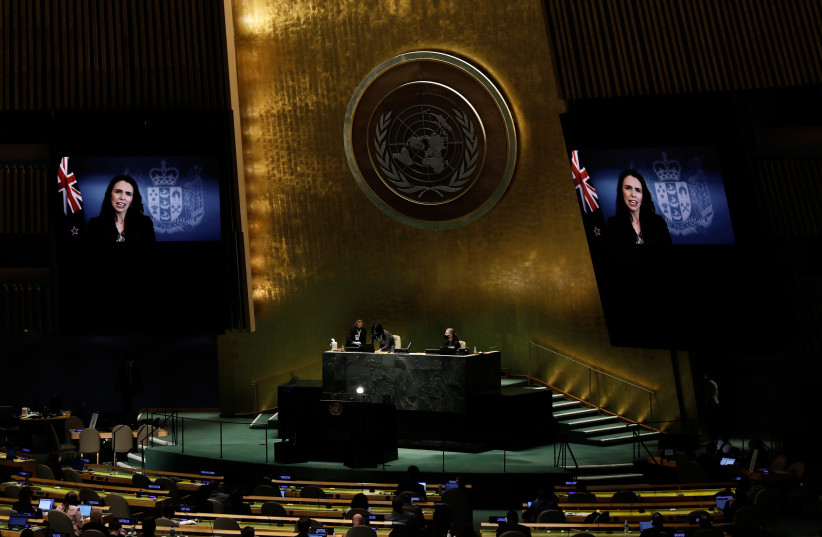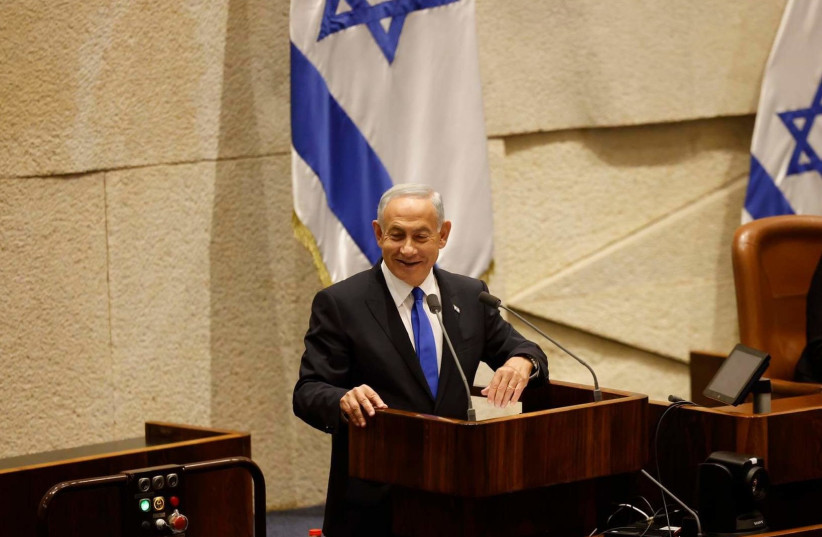by Tovah Lazaroff
The vote seeks an opinion from the International Court of Justice, but whatever opinion the court expresses is not binding.
 |
76th Session of the United Nations General Assembly
(photo credit: REUTERS)
|
Israel rejected the "distorted" United Nations' decision to seek an advisory opinion from the International Court Justice at The Hague on the legal consequences of Israel's "occupation, settlement and annexation of Palestinian territory."
The controversial decision taken by the UN General Assembly Friday night in New York had the support of 87 countries, less than half of the 193-member body.
It passed anyway because only 26 nations opposed the measures, another 53 abstained and 27 were absent.
Countries that voted "no" alongside Israel included the United States, Canada, Australia and eight of the 27 European Union member states.
"Just like the hundreds of distorted UN General Assembly resolutions against Israel over the years, today's disgraceful resolution will not obligate the government of Israel," Prime Minister Benjamin Netanyahu said on Saturday night in a video address.

The resolution seeks an ICJ advisory opinion on whether after 57 years, Israel's "occupation" of Palestinian territory had become a form of de-facto annexation and thus illegal under international law.
It asked the ICJ to define how Israel's practices affected the legal status of Israel's "occupation" of territory over the pre-1967 lines, which would include the West Bank, Gaza and east Jerusalem.
It then asked the ICJ to explain what the consequences would be of that definition. The UNGA resolution underscored the inclusion of the "Holy City of Jerusalem" in its ICJ request.
The resolution also solely referred to Jerusalem's Temple Mount, the holiest site in Judaism, solely by its Muslim name of al-Haram, al-Sharif.
Netanyahu in rejecting the UNGA vote stated that "the Jewish people is not occupying its land and is not occupying its eternal capital Jerusalem. No UN resolution can distort this historical truth."
Foreign Minister Eli Cohen called the UN vote "anti-Israeli," tweeting that it "lends support to terrorist organizations [and] the antisemitic [Boycott, Divestment and Sanctions] movement contravening the agreed-upon principles of the UN itself."
"This initiative represents another error made by the Palestinian leadership, which has been supporting and inciting terrorism for years and leading its people in such a manner that harms the Palestinians themselves, as well as the possibility of resolving the conflict," he said.
Former Ambassador to the UN, MK Danny Danon called for sanctions to be levied against the PA, including withholding travel permits and the transfer of tax fees.
The UN vote came just one day after Netanyahu's ultra-right wing government was sworn into office, with a policy statement that spoke of the "exclusive and inalienable right of the Jewish to all areas of the Land of Israel” and a pledge to put in policies that would allow for the annexation of portions of the West Bank.
The Palestinian Authority and the international community hold that the final boundaries of a Palestinian state should include all of the West Bank, east Jerusalem and Gaza. It has sought an ICJ advisory opinion to help bolster its claim to that territory and to generate additional pressure to force Israel to withdraw to the pre-1967 lines in the West Bank and east Jerusalem.
When a preliminary November 11th vote was held on the request for an ICJ opinion, 98 nations in favor amounting to just over half of the UNGA voted with the PA in favor of that movie and only 17 countries including Israel opposed it.
In the interim, Palestinian support for the resolution dropped by 11 votes, while Israel gained the clear support of an additional nine countries.
Netanyahu credited the drop in PA support to his efforts, explaining, "I have spoken with world leaders who changed their votes as a result."
He also credited the work of President Isaac Herzog, the Foreign Ministry and the Ambassador to the UN Gilad Erdan. He did not mention his predecessor Yair Lapid.
"We have achieved something important. In the UN resolution that was passed in November, the Palestinians had an absolute majority of UN member states that supported their initiative," Netanyahu said.
"Now, after our intervention… there has been a turnaround: The countries that supported the Palestinian initiative were a minority of UN members and those that did not support the Palestinians were a majority of UN member states," he added.
Nine countries changed their stance and voted against the resolution from November to now. This included Albania, Costa Rice, the Republic of the Congo, Kenya, Papa New Guinea, Romania, Togo and Great Britain.
The UK opposes the resolution
A United Kingdom envoy addressed the UNGA on Friday, stating that his country did not feel that a referral to the ICJ was helpful in "bringing the parties back to dialogue."
He added that "it is inappropriate without the consent of both parties to ask the court to give an advisory opinion in what is essentially a bilateral dispute."
The envoy also explained that his country did not support the work of the United Nations Human Rights Council's Commission of Inquiry which had first bought up the matter of an ICJ referral, noting that the group's work helped exacerbated the "disproportionate focus on Israel" at the UN.
Separate from the ICJ inquiry, the British envoy said that his country also opposed the fact that the resolution "refers to the Haram al-Sharif Temple Mount site in Jerusalem in purely Islamic terms.
"The UK has made clear for many years that we disagree with this approach," he said.
Separately, Ukraine, which had supported the measure in November was absent from the vote. Netanyahu's Likud spokesperson confirmed that Netanyahu had raised the matter when he spoke to Ukrainian President Volodymyr Zelensky on Thursday.
Kan reported that in the conversation Zelensky had unsuccessfully sought to receive assurances from Netanyahu that Israel would supply his country with aerial defense systems and would support his four-point peace plan. The Likud spokesperson did not comment on that report.
Palestinian Authority Ambassador to the UN Riyad Mansour called on all UNGA countries, including those that opposed the text, to abide by the ICJ opinion when it was issued.
"We trust that, regardless of your vote today, if you believe in international law and peace, you will uphold the opinion of the International Court of Justice when delivered and you will stand up to this Israeli government right now," Mansour told the General Assembly.
The vote on the ICJ opinion, which was scheduled only toward the end of the week, was held as part of a UNGA debate that began at 6 p.m., after the start of the Sabbath in New York. The UN mission could not participate as a result and its vote was cast by a US envoy.
ICJ opinions are non-binding, but they can be used by the UN and other international bodies.
Israel annexed east Jerusalem after the Six-Day War in 1967, but formally applied sovereignty to it in 1980 and has insisted that the united city is its eternal capital. The West Bank is under IDF military rule, with IDF executing civilian rule over Area C of that region and the Palestinian Authority executing civilian control over Areas A and B of that territory.
World Jewish Congress President Ronald Lauder issued a statement, saying that the vote at the United Nations “exemplifies an ongoing pattern of bias against Israel, and we applaud those 26 countries, including the United States, who voted against this shameful resolution that seeks to isolate and demonize the Jewish state.”
“The text of the measure is as troubling as it is misguided,” Lauder said. “It exclusively refers to the Temple Mount by its Muslim term, erasing the more than 2,500-year-old connection between the Jewish people and Jerusalem.”
He went on to say that this measure “is a direct outgrowth of the biased Commission of Inquiry on Israel, whose commissioners have made antisemitic comments and who have been unabashed critics of Israel. Referral of this issue to the ICJ is yet another barrier to dialogue between Israelis and Palestinians.”
“Peace in the region can only be negotiated by the two sides directly involved,” Lauder said.
Omri Nahmias and Jpost Staff contributed to this report.
Tovah Lazaroff
Source: https://www.jpost.com/israel-news/article-726312
No comments:
Post a Comment